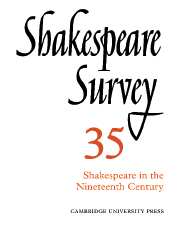Book contents
- Frontmatter
- Before the Shakespeare Revolution: Developments in the Study of Nineteenth-Century Shakespearian Production
- The Meininger Company and English Shakespeare
- Shakespeare at the Burgtheater: From Heinrich Anschütz to Josef Kainz
- Shakespeare on the Melbourne Stage, 1843-61
- Shakespeare in Hazlitt’s Theatre Criticism
- Characterization of the Four Young Lovers in A Midsummer Night’s Dream
- Queenly Shadows: On Mediation in Two Comedies
- Language, Theme, and Character in Twelfth Night
- The Art of the Comic Duologue in Three Plays by Shakespeare
- ‘Spanish’ Othello: The Making of Shakespeare’s Moor
- Ferdinand and Miranda at Chess
- Shakespeare’s Latin Citations: The Editorial Problem
- The Theatre at Christ Church, Oxford, in 1605
- Interpretations of Shakespearian Comedy, 1981
- The Year's Contributions to Shakespearian Study 1 Critical Studies
- 2 Shakespeare’s Life, Times and Stage
- 3 Textual Studies
- Index
- Plate Section
Before the Shakespeare Revolution: Developments in the Study of Nineteenth-Century Shakespearian Production
Published online by Cambridge University Press: 28 March 2007
- Frontmatter
- Before the Shakespeare Revolution: Developments in the Study of Nineteenth-Century Shakespearian Production
- The Meininger Company and English Shakespeare
- Shakespeare at the Burgtheater: From Heinrich Anschütz to Josef Kainz
- Shakespeare on the Melbourne Stage, 1843-61
- Shakespeare in Hazlitt’s Theatre Criticism
- Characterization of the Four Young Lovers in A Midsummer Night’s Dream
- Queenly Shadows: On Mediation in Two Comedies
- Language, Theme, and Character in Twelfth Night
- The Art of the Comic Duologue in Three Plays by Shakespeare
- ‘Spanish’ Othello: The Making of Shakespeare’s Moor
- Ferdinand and Miranda at Chess
- Shakespeare’s Latin Citations: The Editorial Problem
- The Theatre at Christ Church, Oxford, in 1605
- Interpretations of Shakespearian Comedy, 1981
- The Year's Contributions to Shakespearian Study 1 Critical Studies
- 2 Shakespeare’s Life, Times and Stage
- 3 Textual Studies
- Index
- Plate Section
Summary
The emancipation of Shakespeare’s plays from the bonds of the Victorian and Edwardian commercial theatre was achieved against great odds by an alliance between scholarly opinion and artistic imagination–the first, essential step in the process that J. L. Styan has described in The Shakespeare Revolution (Cambridge, 1977). The stage productions, journalism and learned papers of William Poel prepared the way for Harley Granville-Barker, whose productions of The Winter’s Tale, Twelfth Night and A Midsummer Night’s Dream demonstrated that the qualities of Elizabethan staging – continuous action, non-representational settings, rapidity of speech – had a life beyond the rather antiquarian performances of the Elizabethan Stage Society. Granville-Barker brought British Shakespearian staging into the world of an international theatrical movement no longer committed to pictorial realism but open to the influence of a wide range of conventions, ancient and modern. The eclectic, stylized theatre of Reinhardt, the austere, architectural scenes of Appia and Craig, and the exoticism of Diaghilev’s Ballets Russes all exerted their influence. In Great Britain and America – climates unfavourable as yet to subsidized theatre – an ‘other theatre’ grew up, in reaction to the star system, the demands of box-office and the limitations of popular taste for spectacle and historical realism.
- Type
- Chapter
- Information
- Shakespeare Survey , pp. 1 - 12Publisher: Cambridge University PressPrint publication year: 1982

